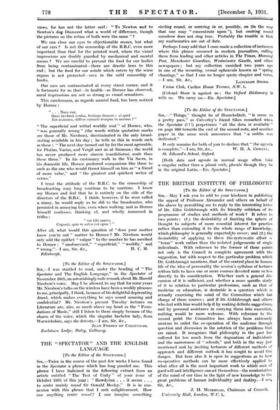THE BRITISH INSTITUTE OF PHILOSOPHY
[To the Editor of the SPECTATOR.]
SIR,—May I ask you to add to your kindness in publishing the appeal of Professor Alexander and others on behalf of the above by permitting me to reply to the interesting letter of Dr. Giles Goldsbrough with its friendly criticism of its programme of studies and methods of work ? It refers to two points : (1.) the desirability of limiting the sphere of thought to subjects of more essential interest for practice rather than extending it to the whole range of knowledge, which philosophy is generally expected,to cover; and (2.) the desirability of applying to these the systematic effort o "team" work rather than the isolated judgements of single individuals. With reference to the former of these points not only is the Council in complete agreement with the suggestion, but with respect to the particular problem which Dr. Goldsbrough mentions, that of the central place in human life of the idea of personality the session's syllabus of lectures seldom fails to have one or more courses devoted more or less directly to its consideration. Whether such a general dis- cussion of it is sufficient, and whether a more specific study of it in relation to particular professions, such as that of medicine or education, is desirable is a question which is actually exercising the mind of the Committee which has charge of these courses ; and if Dr. Goldsbrough and others who led with him would help it by making definite suggestions, and by personal assistance in carrying them into execution, nothing would be more welcome. With reference to the second point the Committee has always been extremely anxious to enlist the co-operation of the audience through question and discussion in the solution of the problems that are raised. It recognizes that philosophy .in the past has suffered far too much from the dogmatisni of individuals and the- narrowness of " schools," and both in the way just mentioned and by inviting lecturers of different methods of approach and different outlook it has sought to avoid this danger. But here also it is open to suggestions as to how co-operative methods can be more effectively applied to what after all is the most important work to which men of good will and intelligence can set themselves—the reorientation of the mind of our time in the light of new knowledge to the great problems of human individuality and destiny.—I am; Sir, &e.,










































 Previous page
Previous page